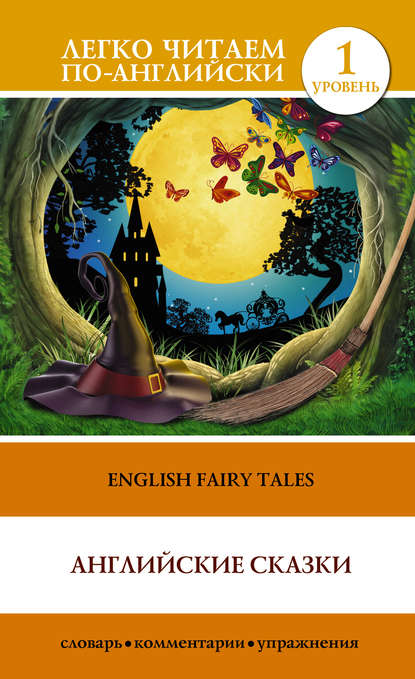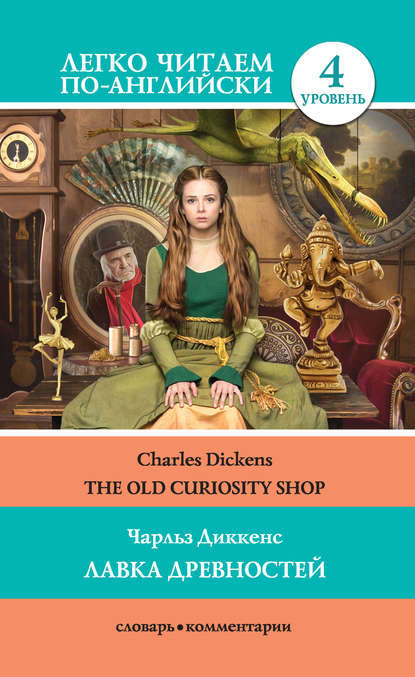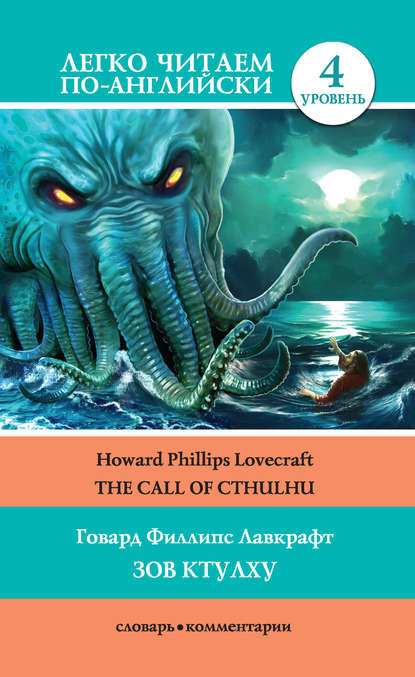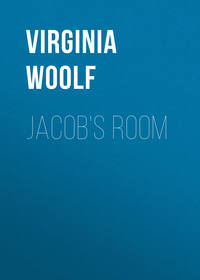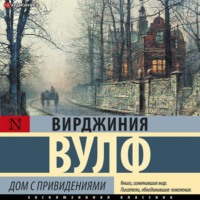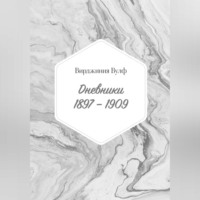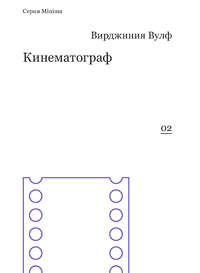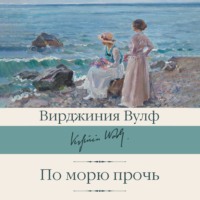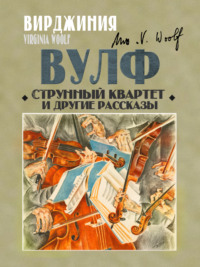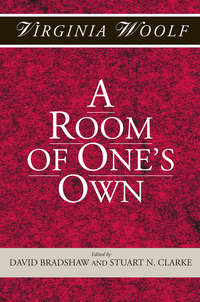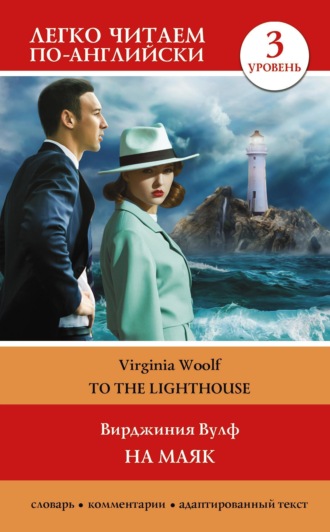
Полная версия
На маяк. Уровень 3 / To the Lighthouse
People can love like this. She wiped one brush after another upon a piece of old rag. Then she looked at her picture.
She nearly wept. It was bad, it was bad, it was infinitely bad! Nobody will look at it, nobody will even hang it. Mr. Tansley was whispering in her ear,
“Women can’t paint, women can’t write.”
She now remembered what she wanted say about Mrs. Ramsay. She was annoyed by some highhandedness. She thought of Mr. Bankes. She thought that no woman could worship another woman in the way he worshipped. Mrs. Ramsay was unquestionably the loveliest of people; the best perhaps; but also, different. But why different, and how different? she asked herself. She scraped her palette of all those mounds of blue and green. How did she differ? What was the spirit in her? She was like a bird, an arrow. She was willful; she was commanding. She opened bedroom windows. She shut doors. The house was full of children.
Oh, but there was her father; her home; even her painting. But all this seemed so little, so virginal, against the other. She liked to be alone; she liked to be herself.
Lily Briscoe looked up at last. She saw Mrs. Ramsay, still presiding.
Was it wisdom? Was it knowledge? Was it, once more, the deceptiveness of beauty? Did she lock up within her some secret? She was sitting on the floor with her arms round Mrs. Ramsay’s knees. She was smiling to think that Mrs. Ramsay would never know the reason of that pressure. She imagined how in the chambers of the mind and heart of the woman were tablets with sacred inscriptions. What was the key to those secret chambers? Can love, as people called it, make her and Mrs. Ramsay one? It was not knowledge but unity that she desired, not inscriptions on tablets, but intimacy itself, which is knowledge. And she put her head on Mrs. Ramsay’s knee.
Nothing happened. Nothing! Nothing! as she leant her head against Mrs. Ramsay’s knee.
And yet, she knew knowledge and wisdom were stored up in Mrs. Ramsay’s heart. Mrs. Ramsay rose. Lily rose. Mrs. Ramsay went. A ray passed Mr. Bankes’s eyes. He put on his spectacles. He stepped back. He raised his hand. He slightly narrowed his clear blue eyes,
Lily winced like a dog that sees a hand raised to strike it. Mr. Bankes was less alarming than another.
Mr. Bankes took out a pen-knife and tapped the canvas with the bone handle. What did she wish to indicate by the triangular purple shape, “just there”? he asked.
It was Mrs. Ramsay reading to James, she said.
Mother and child are the objects of universal veneration. The mother was famous for her beauty. But the picture was not of them, she said. Or, not in this sense. There were other senses too.
A picture must be a tribute. A mother and child can be reduced to a shadow without irreverence. A light here required a shadow there. He considered. He was interested. The truth was that all his prejudices were on the other side, he explained. The largest picture in his drawing-room was of the cherry trees in blossom on the banks of the Kennet. He had spent his honeymoon on the banks of the Kennet, he said. Lily must come and see that picture, he said.
10
Cam grazed the easel by an inch[9]. She did not stop for Mr. Bankes and Lily Briscoe; though Mr. Bankes held out his hand. She did not stop for her father, whom she grazed also by an inch; nor for her mother, who called
“Cam! I want you a moment!”
She flew like a bird, bullet, or arrow. But when Mrs. Ramsay called “Cam!” a second time, Cam turned to her mother. She shifted from foot to foot, and said,
“They are not here, and I’ve told Ellen to wait.”
Minta Doyle and Paul Rayley had not come back then. That meant, Mrs. Ramsay thought, one thing. She must accept him, or she must refuse him. Mrs. Ramsay was very, very fond of Minta. But she read,
“Next morning the wife awoke first, and it was just daybreak. From her bed she saw the beautiful country. Her husband was still stretching himself[10]…”
But how will Minta refuse him? She read on:
“Ah, wife,” said the man, “why be King? I do not want to be King.” “Well,” said the wife, “if you won’t be King, I will. Go to the Flounder, for I will be King.”
“Come in or go out, Cam,” she said.
“And when he came to the sea, it was quite dark grey. The water heaved up from below, and smelt putrid. Then he went and stood by it and said,
Flounder, flounder, in the sea,
Come, I pray you, here to me;
For my wife, good Ilsabil,
Wills not as I’d have her will
‘Well, what does she want then?’ said the Flounder.”
And where were they now? Mrs. Ramsay wondered. She was reading and thinking at the same time. The story of the Fisherman and his Wife was like the melody.
If nothing happens, she will speak seriously to Minta. She was responsible to Minta’s parents – the Owl and the Poker. She remembered her nicknames for them. The Owl and the Poker – yes.
Dear, dear, Mrs. Ramsay said to herself, how did they produce this incongruous daughter? this tomboy Minta, with a hole in her stocking?
How did she exist in that portentous atmosphere? Naturally, one must ask her to lunch, tea, dinner, finally to stay with them. That resulted in some friction with the Owl, her mother. However, Minta came… Yes, she came, Mrs. Ramsay thought. Mrs. Doyle accused her. Wishing to dominate, wishing to interfere, making people do what she wished – that was the charge against her. She thought it most unjust.
She was often ashamed of her own shabbiness. Nor was she domineering, nor was she tyrannical.
She never wanted James to grow older! or Cam either. When she read just now to James, “and there were numbers of soldiers with kettledrums and trumpets,” and his eyes darkened, she thought, why should they grow up and lose all that?
He was the most gifted, the most sensitive of her children. But all, she thought, were full of promise. Prue, a perfect angel, a real beauty. Andrew – even her husband admitted that his gift for mathematics was extraordinary. And Nancy and Roger, they were both wild creatures now. They were scampering about over the country all day long. As for Rose, her mouth was too big, but she had a wonderful gift with her hands. If they had charades, Rose made the dresses. She made everything.
Why should they go to school? She always wanted to have a baby. She liked to carry one in her arms. Then people say she was tyrannical, domineering, masterful. They are happier now than they will ever be again. They all had their little treasures…
And so she went down and said to her husband, Why must they grow up and lose it all? Never will they be so happy again.
And he was angry. Why take such a gloomy view of life? he said. It is not sensible. For it was odd. She believed it to be true. He had always his work. Not that she herself was “pessimistic”. She thought of her life, her fifty years. There it was before her – life. The life is terrible, hostile, and quick to pounce on you if you give it a chance. There were eternal problems: suffering; death; the poor. There was always a woman dying of cancer even here.
She knew what was before them – love and ambition. Why must they grow up and lose it all? And then she said to herself, Nonsense. They will be perfectly happy.
She was making Minta marry Paul Rayley. People must marry; people must have children.
Was she wrong in this? she asked herself. She was uneasy.
“Then he put on his trousers and ran away like a madman,” she read. “But outside a great storm was raging and blowing so hard that he could scarcely keep his feet. Houses and trees toppled over, the mountains trembled, rocks rolled into the sea. The sky was black, and it thundered and lightened. The sea came in with black waves as high as church towers and mountains, and all with white foam at the top.”
She turned the page; there were only a few lines more. She will finish the story. It was getting late. The light in the garden told her that. Then she remembered; Paul and Minta and Andrew had not come back. Andrew had his net and basket. That meant he was going to catch crabs. It was growing quite dark.
She looked into James’s eyes:
“And there they are living still at this very time[11].”
“And that’s the end,” she said.
She saw in his eyes that the interest of the story died away in them. Something else took its place. She turned and looked across the bay. She saw the light of the Lighthouse.
In a moment he will ask her,
“Are we going to the Lighthouse?”
And she will say,
“No: not tomorrow; your father says not.”
Happily, Mildred came in. The bustle distracted them. As Mildred carried him out, she was certain that he was thinking, we are not going to the Lighthouse tomorrow. He will remember that all his life.
11
No, she thought, putting together the pictures – a refrigerator, a mowing machine[12], a gentleman in evening dress – children never forget. For this reason, it was so important what one said, and what one did. It was a relief when they went to bed. For now she need not think about anybody. She could be herself, by herself. To be silent; to be alone. Although she continued to knit, and sat upright, it was thus that she felt herself. When life sank down, the range of experience seemed limitless.
And to everybody there was always this sense of unlimited resources, she supposed. She, Lily, Augustus Carmichael, must feel: our apparitions are simply childish. Beneath it is all dark, it is unfathomably deep. Her horizon seemed to her limitless. They could not stop her, she thought. There was freedom, there was peace, there was a platform of stability.
No one finds rest ever, in her experience, but as a wedge of darkness. One lost the fret, the hurry, the stir. There rose to her lips always some exclamation of triumph over life when things came together in this peace, this rest, this eternity.
She looked out to meet that stroke of the Lighthouse, the long steady stroke, the last of the three, which was her stroke. That light lifted up some little phrase like that – “Children don’t forget, children don’t forget”. She could repeat it. It will end, it will end, she said. It will come, it will come, when suddenly she added, “We are in the hands of the Lord”.
But instantly she was annoyed with herself. Who had said it? Not she. She looked up over her knitting and met the third stroke. It seemed to her like her own eyes meeting her own eyes[13]. They searched into her mind and her heart, they purified out of existence that lie, any lie. She was stern, she was searching, she was beautiful like that light. It was odd, she thought. She looked and looked; a mist rose from the lake. A bride to meet her lover.
Why did she say that: “We are in the hands of the Lord?” she wondered. The insincerity annoyed her. She returned to her knitting again. How could any Lord make this world? she asked. With her mind she had always seized the fact that there is no reason, order, justice: but suffering, death, the poor. She knew that. No happiness lasted; she knew that. She knitted with firm composure.
Her husband passed. He noted the sternness at the heart of her beauty. It saddened him, and her remoteness pained him. He felt, as he passed, that he could not protect her. When he reached the hedge, he was sad. He could do nothing to help her. He must stand by and watch her. Indeed, the infernal truth was, he made things worse for her. He was irritable – he was touchy. He had lost his temper over the Lighthouse. He looked into the hedge, into its intricacy, its darkness.
Mrs. Ramsay listened, but it was all very still. Cricket was over; the children were in their baths; there was only the sound of the sea. She stopped knitting. She held the long reddish-brown stocking in her hands. She saw the light again. With some irony, she was watching it with fascination, hypnotized. Anyway, she had known happiness, exquisite happiness, intense happiness. It silvered the rough waves a little more brightly, as daylight faded. The blue went out of the sea and it rolled in waves of pure lemon which curved and swelled and broke upon the beach. The ecstasy burst in her eyes and waves of pure delight raced over the floor of her mind and she felt, It is enough! It is enough!
He turned and saw her. Ah! She was lovely, lovelier now than ever he thought. But he could not speak to her. He could not interrupt her.
He wanted urgently to speak to her now. James was gone and she was alone at last. But he resolved, no. He won’t interrupt her. She was aloof from him now in her beauty, in her sadness. He passed her without a word, though it hurt him. She looked distant, and he could not reach her, he could do nothing to help her. And again he passed her without a word.
She called to him and took the green shawl off the picture frame, and went to him. For he wished, she knew, to protect her.
12
She folded the green shawl about her shoulders. She took his arm. She began to speak of Kennedy the gardener. His beauty was so great, she said, he was so awfully handsome, that she couldn’t dismiss him. There was a ladder against the greenhouse. Little lumps of putty stuck about. They were beginning to mend the greenhouse.
She strolled along with her husband. She had it on the tip of her tongue to say[14], as they strolled, “It’ll cost fifty pounds”. But instead she talked about Jasper who was shooting birds. He said, at once, that it was natural in a boy. He soothed her instantly. Her husband was so sensible, so just. And so she said, “Yes; all children go through stages[15],” and began considering the dahlias in the big bed. She was wondering about next year’s flowers. Had he heard the children’s nickname for Charles Tansley, she asked. The atheist, they called him, the little atheist.
“He’s not a polished specimen,” said Mr. Ramsay.
“Far from it,” said Mrs. Ramsay.
Mrs. Ramsay was wondering whether it was any use sending down bulbs; did they plant them?
“Oh, he has his dissertation to write,” said Mr. Ramsay.
She knew all about that, said Mrs. Ramsay. He talked of nothing else. It was about the influence of somebody upon something.
“Well, it’s all he has to count on,” said Mr. Ramsay.
“Pray Heaven he won’t fall in love with Prue,” said Mrs. Ramsay.
“He’ll disinherit her if she marries him,” said Mr. Ramsay.
He did not look at the flowers, which his wife was considering.
“There is no harm in him,” he added.
He was just about to say that anyhow he was the only young man in England who admired his – when he stopped. He did not want to bother her again about his books.
“These flowers seem creditable,” Mr. Ramsay said.
He lowered his gaze and noticed something red, something brown.
“Yes, I put in these flowers with my own hands,” said Mrs. Ramsay.
The question was, what happened if she sent bulbs down; did Kennedy plant them? It was his incurable laziness; she added.
So they strolled along, towards the red-hot pokers.
“You’re teaching your daughters to exaggerate,” said Mr. Ramsay.
Her Aunt Camilla was far worse than she was, Mrs. Ramsay remarked.
“Nobody ever saw your Aunt Camilla as a model of virtue,” said Mr. Ramsay.
“She was the most beautiful woman I ever saw,” said Mrs. Ramsay.
“Somebody else was that,” said Mr. Ramsay.
Prue was going to be far more beautiful than she was, said Mrs. Ramsay.
He saw no trace of it, said Mr. Ramsay.
“Well, then, look tonight,” said Mrs. Ramsay.
They paused. Andrew must work harder. He will lose every chance of a scholarship if he doesn’t.
“Oh, scholarships!” she said.
Mr. Ramsay thought her foolish for saying that, about a serious thing, like a scholarship.
“I will be very proud of Andrew if he gets a scholarship,” he said.
“And I will be just as proud of him if he doesn’t,” she answered.
They disagreed always about this, but it did not matter. She liked him to believe in scholarships. He liked her to be proud of Andrew whatever he did. Suddenly she remembered those little paths on the edge of the cliffs.
Wasn’t it late? she asked.
They hadn’t come home yet. He looked at his watch. It was only just past seven. He held his watch open for a moment. It was not reasonable to be nervous. Andrew is not a little boy. Then, he wanted to tell her that when he was walking on the terrace just now, – here he became uncomfortable. He felt that solitude, that aloofness, that remoteness of hers. But she pressed him. What did he want to tell her, she asked.
She was thinking it was about going to the Lighthouse. Was he going to say he was sorry for being harsh? But no. He did not like to see her look so sad, he said. She flushed a little. They both felt uncomfortable, as if they did not know whether to go on or go back.
She was reading fairy tales to James, she said.
No, they could not share that; they could not say that.
They had reached the gap between the two clumps of red-hot pokers. There was the Lighthouse again. But she did not look at it.
She looked over her shoulder, at the town. The lights were rippling and running as if they were drops of silver water in a wind.
All the poverty, all the suffering had turned to that, Mrs. Ramsay thought.
The lights of the town and of the harbour and of the boats seemed like a phantom net. Mr. Ramsay wanted to tell the story how Hume was stuck in a bog. He wanted to laugh. It was nonsense to be anxious about Andrew. When he was Andrew’s age he used to walk about the country all day long. He had nothing but a biscuit in his pocket and nobody bothered about him.
He said he was going to spend a day alone. Enough of Bankes and of Carmichael. He wanted a little solitude.
Yes, she said.
It annoyed him that she did not protest. She knew that he would never do it. He was too old now to walk all day long with a biscuit in his pocket. She worried about the boys, but not about him. Years ago, before he had married, he thought, he had walked all day. He had made a meal off bread and cheese in a public house[16]. He had worked ten hours.
That was the view he liked best, over there; those sandhills. One could walk all day without meeting a soul. There was not a house scarcely, not a single village for miles on end. There were little sandy beaches where no one had been since the beginning of time. The seals sat up and looked at you.
It sometimes seemed to him that in a little house out there, alone – he stopped. He sighed. He had no right. The father of eight children – he reminded himself. He will be a beast and a cur if he changes something. Andrew will be a better man than he was. Prue will be a beauty, her mother says. His eight children – a good bit of work.
“Poor little place,” he murmured with a sigh.
She heard him. He said the most melancholy things. But she knew when he said them he always seemed more cheerful afterwards. All this phrase-making was a game, she thought.
It annoyed her, this phrase-making, and she said to him, that it was a perfectly lovely evening. And what was he groaning about, she asked.
She was half laughing, half complaining, for she guessed what he was thinking. He can write better books if he is not married.
He was not complaining, he said.
She knew that he did not complain. She knew that he had nothing whatever to complain of. And he seized her hand and raised it to his lips and kissed it with an intensity that brought the tears to her eyes. Then he dropped it.
They turned away and began to walk up the path where the silver-green spear-like plants grew, arm in arm.
His arm was almost like a young man’s arm, Mrs. Ramsay thought, thin and hard.
She thought with delight how strong he still was, though he was over sixty. And how untamed and optimistic. He was convinced of all sorts of horrors, but they did not depress him, but cheered him.
Was it not odd, she reflected?
Indeed he seemed to her sometimes blind, deaf, and dumb to the ordinary things. But to the extraordinary things, he had an eye like an eagle’s. His understanding often astonished her. But did he notice the flowers? No. Did he notice the view? No. Did he even notice his own daughter’s beauty, or a pudding on his plate or roast beef? He sits at table with them like a person in a dream. And his habit of talking aloud, or saying poetry aloud!
“Best and brightest come away!”
Mrs. Ramsay showed him, by a little pressure on his arm, that he walked up hill too fast for her. She must stop for a moment to see whether those were fresh molehills on the bank. A great mind like his must be different from ours.
At that moment, he said, “Very fine,” to please her. He pretended to admire the flowers. But she knew quite well that he did not admire them. He did not even realise that they were there. It was only to please her.
Ah, but was that not Lily Briscoe with William Bankes? She focused her eyes upon the backs of the couple. Yes, indeed it was. Did that not mean that they would marry? Yes, it must! What an admirable idea! They must marry!
13
He had been to Amsterdam, Mr. Bankes was saying as he strolled across the lawn with Lily Briscoe. He had seen the Rembrandts[17].
He had been to Madrid. Unfortunately, it was Good Friday[18] and the Prado was shut.
He had been to Rome. Had Miss Briscoe never been to Rome? Oh, she must! It will be a wonderful experience for her – the Sistine Chapel[19]; Michael Angelo[20]; and Padua, with its Giottos[21].
She had been to Brussels; she had been to Paris but only for a short visit to see an aunt who was ill. She had been to Dresden; there were masses of pictures she had not seen. However, Lily Briscoe reflected, perhaps it was better not to see pictures. They only made one hopelessly discontented with one’s own work.
We can’t all be Titians and we can’t all be Darwins, he said. At the same time, we won’t have Darwins and Titians if we don’t have humble people like ourselves. Lily wanted to pay him a compliment; you’re not humble, Mr. Bankes. But he did not want compliments (most men do, she thought), and she was a little ashamed of her impulse and said nothing.
Anyhow, said Lily, she would always go on painting, because it interested her.
Yes, said Mr. Bankes, he was sure she would.
As they reached the end of the lawn he was asking her whether she could easily find subjects in London when they turned and saw the Ramsays. So that is marriage, Lily thought.
Mrs. Ramsay greeted them with her usual smile (oh, she’s thinking we’re going to get married, Lily thought) and said,
“I have triumphed tonight”.
That meant Mr. Bankes had agreed to dine with them. Then Prue ran to them with a ball. Her mother said,
“Haven’t they come back yet?”
Then she asked,
“Did Nancy go with them?”
14
Certainly, Nancy had gone with them. Minta Doyle had asked it with her dumb look. She did not want to go. She did not want to be drawn into it all[22]. As they walked along the road to the cliff Minta was taking her hand. Then she let it go. Then she took it again. What did she want? Nancy asked herself.
There was something, of course, that people wanted. When Minta took her hand and held it, Nancy, reluctantly, saw the whole world spread out beneath her. Nancy asked, when Minta took her hand. “What is it that she wants? Is it that?” And what was that? Here and there emerged from the mist a pinnacle and a dome, the things without names.
Minta, Andrew observed, was rather a good walker. She wore more sensible clothes that most women. She wore very short skirts. She could jump straight into a stream and flounder across. He liked her rashness, but he saw that she could kill herself. She was afraid of nothing – except bulls. At the mere sight of a bull in a field she threw up her arms and ran away. She knew she was an awful coward about bulls, she said. But didn’t mind what she said or did. Suddenly now she stood on the edge of the cliff and began to sing a song:
“Damn your eyes, damn your eyes!”




